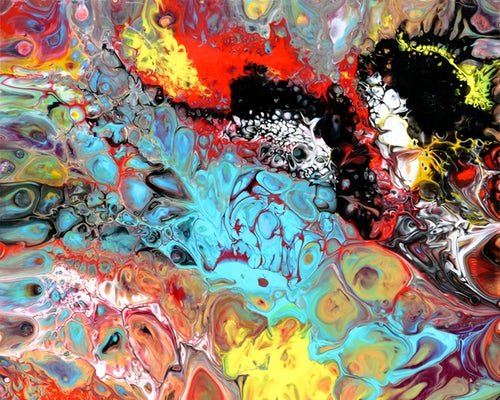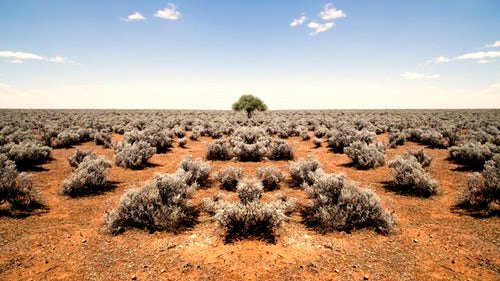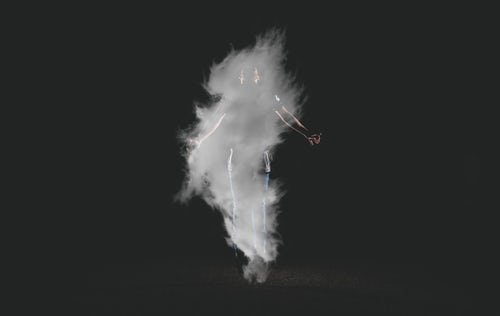
One of the most difficult things describe about a psychedelic experience is its intensity. I have said that it as like being in the ocean or the desert. It is a "landscape" that is more powerful than you and you are at the mercy of its oppressive heat or crashing waves. You must accept it and adapt to it because its sands or waters have no regard for your wishes. It is like a storm that looms in the distance before forcing the sky to open above you whether you want it to or not. It is you and you are one with the chaos that it unleashes. That is pretty cryptic and it can probably be interpreted negatively by one who has never consumed a psychedelic drug. Being trapped in the ocean and embracing chaos are not typically things that one would describe as a pleasant experience but there is value in that type of intensity. We have a tendency of over blowing the importance of trivial problems. Small things often make us sad (crying over a minor rejection) or angry (road rage) when they really shouldn't. We live in the modern world where we don't need to run from predators or forage for food. Events in our lives lack the urgency and the intensity that they had in the distant past and I think that drives some of the overreactive emotional behavior that we can observe in ourselves. Psychedelics and the intense experience that they provide may be able to function as a sort of "shock therapy." That is to say, they may help to reduce our drive to emotionally overreact to minor stimuli because they give us a taste of what real emotional intensity feels like and that can cause a shift in the paradigm against which we gauge the significance of emotional events that we encounter in our lives.

Trips can feel quite chaotic and that is the source some of their intensity. The stereotype is that "drugs" slow a person's mind but the opposite is true with these substances. There is an overabundance of sensory data that a user's mind is trying to process. This forces the experience to the forefront of a person's consciousness which makes it feel as though it has a great deal of gravity. Everything seems important and meaningful as thoughts, feelings, and interpretations crash over the user at such speed that time, itself, seems to slow.
I remember taking a light two gram mushroom trip, once. A friend and I were just past our peaks and another person stopped by to smoke a little weed with us. I recall talking to him but the words are lost to me. While I sat across from him, there seemed to be a gray fog (which was probably smoke, come to think of it) swirling around in front of me, the walls were quivering and covered with translucent, green and gold, "peacock feather" patterns, and I could not slow my mind enough to focus on what he was saying. He laughed at me and I understood that I was making no sense but all I could do was accept the trip, relax, and laugh along with him.

These sorts of intense psychedelic occurrences can cause a lasting shift in the way we look at the significance of emotional events and also changes the way in which we react to them. A psychonaut is given a new basis for comparison by which to judge things. The sting of sadness or heat of anger that one feels over some minor disturbance seems smaller when it is seen next to the magnified emotions that defined his or her psychedelic experience. That new perspective alters the unconscious calculation that we make when we respond to emotional stimuli. Our anger is a little less fierce and the depth of our sadness is a little less low because those small disturbances can never match the intensity of the psychedelic trip. To put it simply (though a bit inaccurately), it is hard to get mad about seeing pealing wallpaper after you just finished watching your walls melt.
I have said and I have heard other psychonauts say that coming down is often more pleasurable than the trip itself. This phenomenon is the manifestation of the benefits of this psychedelic "shock therapy." When the trip fades, a psychonaut notices the contrast between the intensity of the psychedelic experience and that of the "sober" world. It is a relief to return to reality. Even though nothing about the world has changed, it seems slightly calmer than it had been before the trip. Peace has been pulled from the chaos and that is a lasting trophy that one can carry back from the psychedelic realm. I used to say that the day after a trip feels like the best day of one's life. The understanding of what real intensity is and the knowledge that it has passed gives birth to an inner tranquility that seems to suppress the urge to jump to emotional overreactions. In my mind, that effect has the potential to positively impact problematic emotional states like depression, unwarranted anxiety, and needless anger.

Many psychedelics are relatively safe and their benefits are long lasting which could make them a preferable option for those who are looking address their emotional distress, without the use of pharmaceutical drugs. I once told my doctor that I had been feeling a little "panicy" for no real reason. He prescribed me Xanax and told me to be careful with it because it is super addictive. I chose to smoke weed instead of taking the pills and those feelings passed after a few weeks. Psychedelics, for the reasons that I have discussed, likely would have rid me of the panic (after what I imagine would have been a very difficult trip) in a night, without the risk of addiction. Those benefits would have lasted for quite a long time too. I typically feel unusually good for about a week after a trip. There is some debate as to whether mushrooms are or cannabis is the safer way to alter one's consciousness but any drug that is compared to cannabis, in terms of its safety, is far safer than the vast majority of prescription drugs on the market. That should make mushrooms (the other common psychedelics are usually pretty safe too but I would stay away from research chemicals and designer drugs) an attractive avenue of therapy for people who suffer from short term psychological conditions that are typically treated with the temporary use of far more damaging pharmaceutical drugs.
Can psychedelics fix all the problems that are caused by our emotional overreactions, cure our depression, and keep us from yelling horrible things at the slow cars in the fast lane? Sadly, they can't do all of that, even though I would like to say that that they could. The truth is that they are powerful and effective medicines (and, occasionally fun recreational drugs, however, that is a different post) but they are not our saviors. They can help us be a little less angry or a little less depressed and sometimes that is enough to make a difference in how we interact with and respond to reality and the people in it. That might sound like a small thing but if we were all a little nicer and a little happier, I think that the would be a measurably better place.
Peace.
All the images in this post are sourced from the free image website unsplash.com.
I always like your psychedelic articles...
now one of the pictures reminds me of a favorite album recently...
Your balance is below $0.3. Your account is running low and should be replenished. You have roughly 10 more @dustsweeper votes. Check out the Dustsweeper FAQ here: https://steemit.com/dustsweeper/@dustsweeper/dustsweeper-faq
You should try a psychedelic at least once in your life. It can be a real game changer.
beautiful!
Resteemed by @resteembot! Good Luck!
Check @resteembot's introduction post or the other great posts I already resteemed.